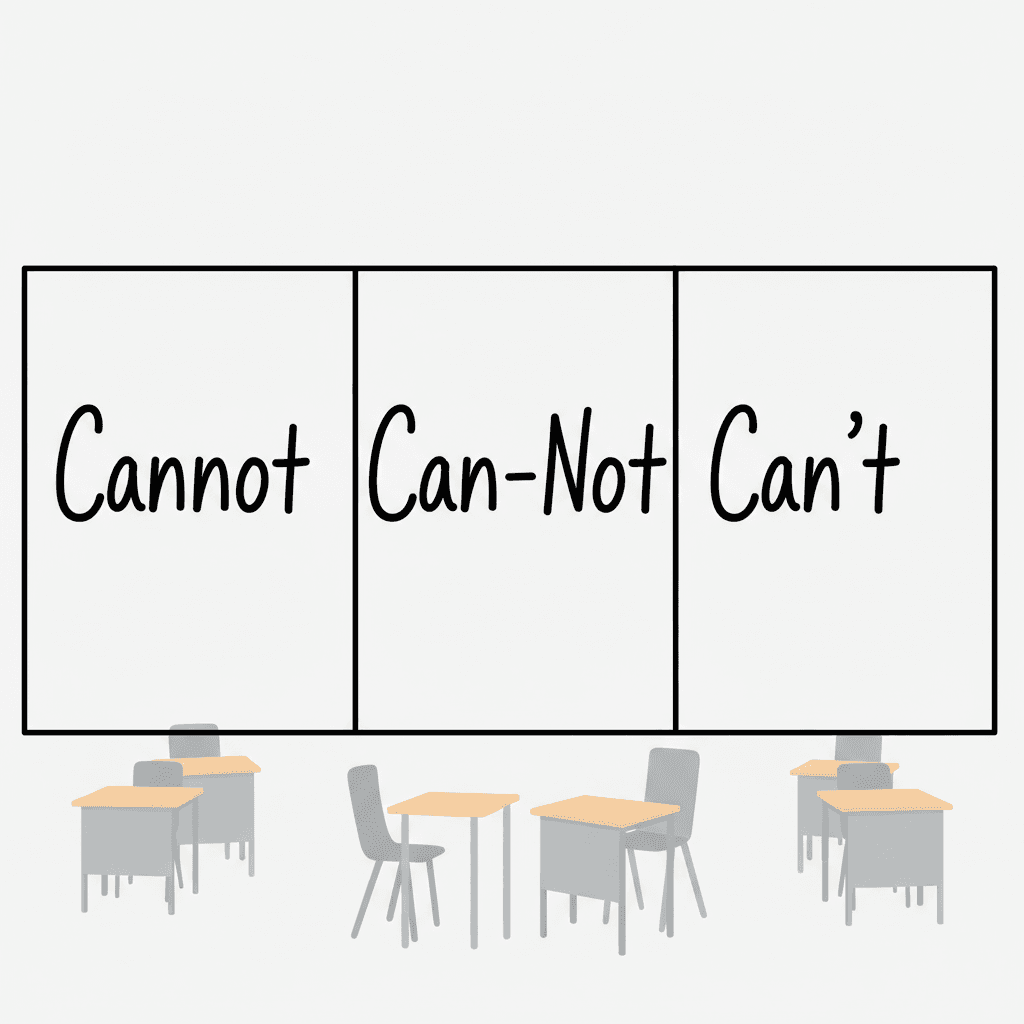Cannot vs. Can Not vs. Can’t: What’s the Difference?
 All three forms — cannot, can not, and can’t — express inability or prohibition, but they’re used in slightly different ways depending on formality and emphasis.
All three forms — cannot, can not, and can’t — express inability or prohibition, but they’re used in slightly different ways depending on formality and emphasis.
Let’s go through them one by one.
1. Cannot: The Standard and Most Common Form
Meaning
“Cannot” is the standard negative form of can.
It’s used in almost all types of writing — both formal and informal — and means “to be unable to.”
Examples (10 total)
- I cannot believe this is happening.
- She cannot swim.
- We cannot make any promises yet.
- He cannot attend the meeting tomorrow.
- I cannot thank you enough for your help.
- You cannot smoke inside the building.
- They cannot find their tickets.
- He cannot remember where he parked.
- We cannot allow late submissions.
- I cannot live without coffee!
🧠 Tip:
Use cannot in most cases — it’s the standard and most accepted form in writing.
2. Can Not: Emphasis or Separation
Meaning
“Can not” is grammatically correct but much less common.
It’s usually used when you want to emphasize the “not” or when “can” and “not” belong to different parts of a sentence (for example, when not applies to another word or phrase).
Examples (10 total)
- You can not only dance but also sing! (here, “not” belongs to “not only”)
- I can not go, but I might go later. (emphasis)
- We can not confirm the news at this time. (formal tone)
- You can not underestimate his talent.
- They can not ignore the facts any longer.
- She can not agree to those terms.
- He can not fail again — it’s his last chance.
- I can not explain how happy I am!
- We can not let this opportunity slip away.
- You can not only rely on luck; you must work hard.
🧠 Tip:
Use can not if you want to stress the “not” or if it’s part of a phrase like “not only... but also.”
3. Can’t: The Contraction (Informal Form)
Meaning
“Can’t” is the contraction of cannot and is common in speech and informal writing.
It has the same meaning — “to be unable to” — but sounds more natural in conversation.
Examples (10 total)
- I can’t believe it!
- She can’t come with us.
- We can’t wait to see you again.
- He can’t find his phone.
- You can’t always get what you want.
- I can’t swim very well.
- They can’t understand this problem.
- It can’t be true!
- I can’t go out tonight — I’m tired.
- He can’t remember the password.
🧠 Tip:
Use can’t in speaking, emails, or casual writing — it’s friendly and conversational.
Quick Comparison Table
| Form | Use | Tone | Example |
|---|---|---|---|
| Cannot | Standard form, most common | Neutral / Formal | I cannot attend today. |
| Can not | For emphasis or structure | Formal / Emphatic | You can not only win but also inspire. |
| Can’t | Contraction of cannot | Informal / Conversational | I can’t believe it! |
How to Remember the Difference
👉 Cannot = Always safe for writing
👉 Can not = Rare, for emphasis
👉 Can’t = Informal, conversational
💡 Memory Trick:
If you’re writing an essay or email, use cannot.
If you’re texting or speaking, use can’t.
Common Mistakes
❌ I can not believe it!
✅ I cannot believe it!
❌ You can’t smoke here! (✖ in formal signs)
✅ You cannot smoke here.
❌ We cannot only focus on numbers.
✅ We can not only focus on numbers.
Why Writers Mix Them Up
Because can not looks logical, some assume it’s always correct — but English prefers cannot in nearly every case.
Even AI text can misuse contractions or split negatives, which is why Humanizey helps rewrite AI-generated text naturally to follow context and tone.
FAQs
1. Is “cannot” one word or two?
It’s one word. Cannot is the correct standard form for formal or written English.
2. Can I use “can’t” in academic writing?
Avoid it — use cannot instead for a formal tone.
3. Is “can not” wrong?
No, it’s grammatically correct but rare. Use it only for emphasis or specific phrases like “not only.”
4. What’s the difference between “can’t” and “won’t”?
Can’t means unable to, while won’t means unwilling to.
Example: I can’t swim (I don’t know how); I won’t swim (I refuse to).
Practice: Choose the Correct Form (“Cannot,” “Can Not,” or “Can’t”)
(Answers are listed at the end.)
- I ___ believe we finally did it!
- You ___ smoke inside the restaurant.
- She ___ only cook but also paint beautifully.
- We ___ go now; the gate is closed.
- He said he ___ finish the project today.
- You ___ underestimate their strength.
- I ___ remember his name.
- They ___ come tonight; they’re busy.
- We ___ wait any longer.
- I ___ help laughing!
Answers
- can’t
- cannot
- can not
- can’t
- can’t
- can not
- cannot
- can’t
- cannot
- can’t
